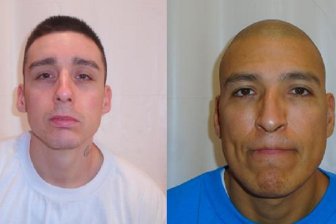A B.C. jury has found a man who escaped from a minimum-security Vancouver Island prison guilty of first-degree murder in the 2019 death of a 60-year-old Metchosin father of two.
The 12-member jury returned the conviction against James Lee Busch in the slaying of Martin Payne Wednesday evening at B.C. Supreme Court in Vancouver after one day of deliberations.
“We’re elated to that Busch will be held accountable for his actions, and that honestly the public is more safe without him on the streets,” Payne’s daughter Jessica told reporters outside the court.
“As I was sitting there listening to the evidence, I thought how can it not be this, you know? So hearing them come back with that verdict was a great feeling,” his other daughter Calla said.
The jury came to the verdict unaware that Busch’s co-accused, Zachary Armitage, had pleaded guilty to first-degree murder midway through the trial, information Global News could not report until the conclusion of the trial.
The two men had initially been standing trial together, however Armitage was removed from the proceedings, with Justice David Crossin instructing the jury not to speculate as to why.
Payne was murdered on July 8, 2019 and found dead in the bathroom of his home four days later. He was killed after returning home from his job as a Victoria mail carrier, according to Crown prosecutors.

Armitage and Busch had escaped the William Head institution, about eight kilometres away, skirting the oceanside facility’s fencing by walking along the shoreline at low tide, the day before his death, prosecutors alleged.
At trial, the court heard Busch was arrested wearing Payne’s clothing and in possession of his house and truck keys. The court also heard police had recovered three weapons at the scene: a hatchet, a Bowie knife and a small knife.
The jury heard expert testimony that Payne had died of chop wounds consistent with a hatchet delivered from behind, and sharp wounds consistent with a Bowie knife delivered from the front.
Unless Payne’s killer was a “master ninja” who could use three weapons at once, there must have been two attackers in his home, prosecutors told the jury.
The jury also heard that two sets of bloody footprints were found in Payne’s home, and that DNA on a pair of shoes in the house proved Busch was there.

Only Armitage’s fingerprints were found in the home, however, and someone used a web browser on a computer in the house to search for the William Head Institution, two men escaping a Victoria-area prison, “private water taxi,” and “Zachary Armitage” but not “James Busch.”
Busch’s defence lawyer told the jury that DNA evidence and a lack of blood spatter on his client’s clothes meant either he wasn’t in the house, didn’t take part in the murder, or his only involvement was in cleaning up the crime scene.
“A mere connection in time and space to Mr. Armitage, does not equate to an inescapable finding that Mr. Busch then committed, participated in or aided in the commission of a murder,” Ryan Drury said Tuesday.
At the time of their escape, Busch, was serving an indeterminate sentence for second-degree murder and assault, while Armitage was serving a nearly 14-year sentence for robbery, aggravated assault and other offences.
At the time of the escape, the William Head Institution’s warden told Global News the two inmates were housed in a minimum-security prison because they had been “cascaded down” to the facility following regular assessments by corrections staff.
Armitage and Busch were eventually arrested on July 9, three days after their escape, after approaching a man walking a dog who happened to be an off-duty police officer.
Both Armitage and Busch pleaded not guilty to the murder on Nov. 14.
First-degree murder carries an automatic life sentence, with no chance of parole for 25 years.



Post a Comment